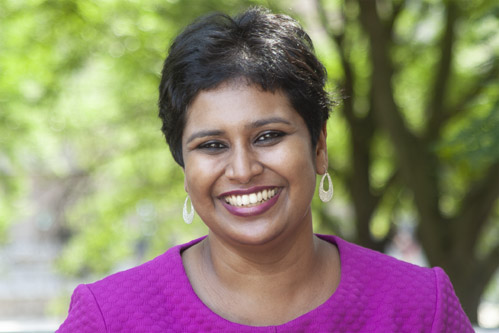New Faculty Focus: Darshana Mini
Darshana Mini, assistant professor of film studies, Department of Communication Arts, College of Letters & Science
Hometown: I was born in Trivandum, the capital of the Kerala, India’s southernmost state.
 Educational/professional background: B.A., English, University of Kerala, India; M.A., English, Delhi University; M.Phil in Social Sciences, CSSSC, Calcutta, India; PhD in Cinema and Media Studies, University of Southern California.
Educational/professional background: B.A., English, University of Kerala, India; M.A., English, Delhi University; M.Phil in Social Sciences, CSSSC, Calcutta, India; PhD in Cinema and Media Studies, University of Southern California.
How did you get into your field of research? Broadly speaking, my research explores how media practices interact with normative gender codes. Some of the things I study include the soft-porn industry in India, gender representations in film and television and women’s film labor. I do this by moving beyond binaries of good and bad media forms. For example, I have sometimes observed gender-positive labor practices in the soft-porn industry, while the mainstream film industry can often be patriarchal and regressive in how it treats its female work force. My work tries to untangle such issues by looking at both text and context. My work is built on field research and I use an ethnographic lens to tease out the varied ways in which desire and transgression operates in the Indian public sphere.
What attracted you to UW–Madison? The Communication department at UW–Madison is an exciting place to work and the crossover between the four areas (Rhetoric, communication science, Media and cultural studies and film) makes it an attractive place for doing interdisciplinary research. Since my research falls within the interstices of humanities and social sciences, it gives me enough scope to build new courses that can appeal to the students who are interested in transnational media and migration. Also, the department is rife with the potentials of being able to talk to, learn from and collaborate with colleagues with a range of diverse interests.
What was your first visit to campus like? I have fond memories of my campus visit. It certainly was a packed day with lots of meetings. The interactions and exchanges I had with the students and faculty gave me an opportunity to explore the resources the campus has to offer. I was finishing my PhD when I visited the campus in early March and was thrilled to return to the campus as a faculty a few months later. I also remember fondly that the department chair offered me tea and chocolates when I was waiting for the job talk to begin.
What’s one thing you hope students who take a class with you will come away with? My teaching philosophy is rooted in instilling a collaborative spirit amenable to mutual learning and sharing. As someone trained in literature, gender and media studies, my primary focus is to enable students to understand the disciplinary moorings that underlie the readings that we discuss, while being open to other methods, disciplines and ways of learning. I like to facilitate critical engagement with material and balancing it with the different worldviews and experiences that students bring into the class. This is crucial in expanding their horizons of knowledge. Engagement with media that might sometimes be outside their realm of familiarity, or even defamiliarizing what may be familiar is important to critical thinking. I think a class or a semester is successful if I can foster their critical faculties and intellectual curiosity.
Do you share your expertise and experiences with the public through social media? If so, which channels do you use? I tweet sometimes, but not as much this semester, since I have been busy with online teaching!
Do you feel your work relates in any way to the Wisconsin Idea? The need to expand the scope of learning by using it outside the classroom is something that really connects me with the Wisconsin Idea. I really feel that students will benefit a lot from working closely with the community groups in specific projects. I am currently teaching a course on migrant media, and it’s my “pilot” so to speak. In later iterations of this course, I would love to tie-up with some organizations working on refugee and asylum rights to find opportunities for internship or collaboration for students as a part of the course. A collaborative approach can help them to see how economic and social disparities operate at a grassroot level and the role of communication technologies in pushing for change.
